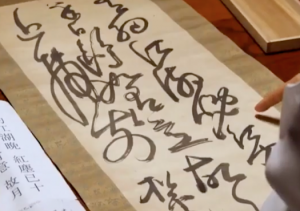
The first poem of the Therag?tha-p?li attributed to Venerable Subh?ti is a great work of literature in terms of its high poetic skills as well as the deeper metaphysical implications. At the moment of attaining the bliss of arahanthood Ven. Subh?ti celebrates his realization declaring –
Chann? me ku?ik? sukh? niv?t?, vassa deva yath?sukha?;
citta? me susam?hita? vimutta?, ?t?p? vihar?mi vassa dev?”ti.
Translation–
“My small hut is roofed, pleasant, draught-free; rain, sky (-deva), as you please; my mind is well-concentrated, released; I remainzealous[1]; rain, sky (-deva)”. (italicsare mine)
At the initial reading, the verse seems to personify the ‘rains’ and demonstrates the strong self-confidence of the poet to face whatever calamity that may come along the rains. Each of these words, however, needs to be explained to get at the deeper metaphysical implications of the poem. The Therag?tha commentary clarifies the terms with all the possible meanings and what is most appropriate in this occasion.[2]
chann?(roof) – meaning the coverage.
me– meaning ‘my’ although used to mean ‘my ’ (indicating a possessive idea) the term is instrumentally (kara?e) used to mean ‘by me’ (indicating impersonal sense). The term has to be understood as spoken by a being who is the lord of ‘me’ (s?mi-atthe eva da??habbo). In other words, it is not ‘I’ who has attained to the blissful state but a being who is the lord of ‘I’. The poet has overcome the shackles or selfish desires and all the egoistic ideas. Therefore, in his use of language and personal pronouns, it is not for demonstrating any kind of personality-pride. It is merely for the sake of communicating the idea.
ku?ik?– literally means hut. The term has several connotations (like the mother’s womb –m?tukucchi, the impure physical body (karajak?ya) sheltering the bones, flesh, muscles, etc.). However, in this particular usage the term refers not to those which are generally known (ap?ka?aku?i) but to the ascetic’s hut made of leaves (pannas?l?ya).
Simply, the verse means that, – perfect realization of wisdom is done, I am pleased at this, I am firmly rooted and well roofed. Therefore, Rain o, sky (I am active –?t?p?–to face you).
The irony here is that the hut in which ascetics meditate are made of leaves and branches which actually are so flexible that, if there is a strong wind it will be hard even to trace their existence. Yet, in this metaphorical usage Ven. Subh?ti is overwhelmed to discover himself having the power to resist against any natural disaster. He even welcomes the rain, or the rain-god (if there is any) which he is certain that have no capacity to move him from the position he has attained. He (as the definition ofme– is given in the commentary) is the lord of a house and thereby extending his power to control the natural mishaps.
This sort of metaphors is widely popular in Buddhist literature. In fact, in the firstud?nathe Buddha compares himself with a hut or a house. The birth giver of the house is ‘craving’ itself. Now, after the attainment of enlightenment, the birth-giver has been destroyed with the roots. Ven. Subh?ti’s poem too has a similar message. In that, the house is the wisdom. The rain is the ignorance. This house has been so well-established that, he confirms and welcomes any rival power against which he can resist and protect himself. This must not be understood as a pride but, as a rapturous joy (p?tisukha) that Buddha and arahants dwell in.
[1]?t?pitranslated as ‘zealous’ needs some examination, as being zealous in an arahant’s attainment seems awkward. CSCD dictionary gives following renderings for ‘?t?pi’ as – Ardent, zealous, strenuous, active. Of these ardent and active seems more appropriate than ‘zealous.’
[2]I have quoted only few for the sake of the present discussion.








